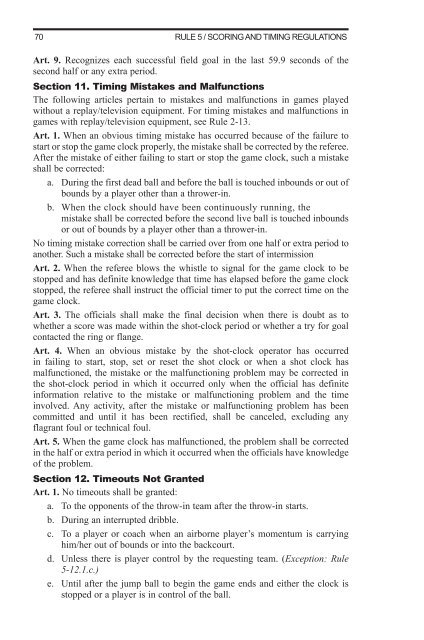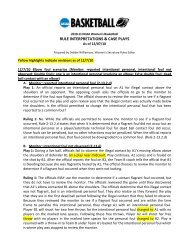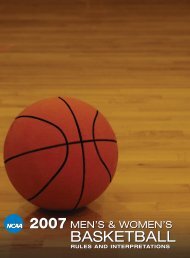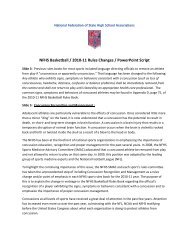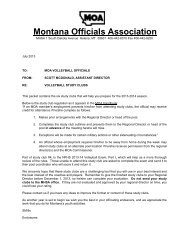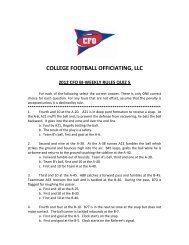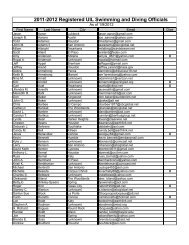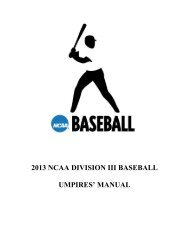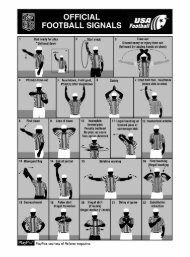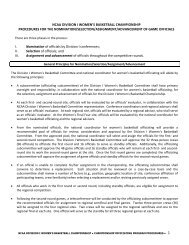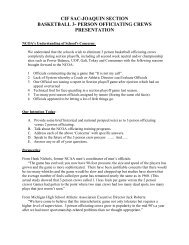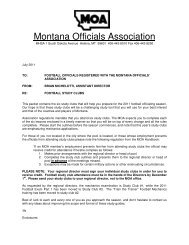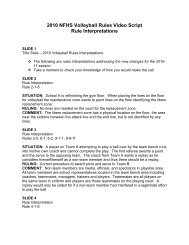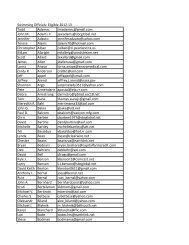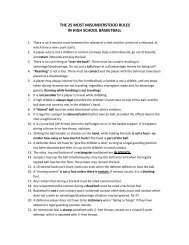2011-12 AND 2012-13 MEN'S AND WOMEN'S RULES - NAIA
2011-12 AND 2012-13 MEN'S AND WOMEN'S RULES - NAIA
2011-12 AND 2012-13 MEN'S AND WOMEN'S RULES - NAIA
Create successful ePaper yourself
Turn your PDF publications into a flip-book with our unique Google optimized e-Paper software.
70<br />
RULE 5 / SCORING <strong>AND</strong> TIMING REGULATIONS<br />
Art. 9. Recognizes each successful field goal in the last 59.9 seconds of the<br />
second half or any extra period.<br />
Section 11. Timing Mistakes and Malfunctions<br />
The following articles pertain to mistakes and malfunctions in games played<br />
without a replay/television equipment. For timing mistakes and malfunctions in<br />
games with replay/television equipment, see Rule 2-<strong>13</strong>.<br />
Art. 1. When an obvious timing mistake has occurred because of the failure to<br />
start or stop the game clock properly, the mistake shall be corrected by the referee.<br />
After the mistake of either failing to start or stop the game clock, such a mistake<br />
shall be corrected:<br />
a. During the first dead ball and before the ball is touched inbounds or out of<br />
bounds by a player other than a thrower-in.<br />
b. When the clock should have been continuously running, the<br />
mistake shall be corrected before the second live ball is touched inbounds<br />
or out of bounds by a player other than a thrower-in.<br />
No timing mistake correction shall be carried over from one half or extra period to<br />
another. Such a mistake shall be corrected before the start of intermission<br />
Art. 2. When the referee blows the whistle to signal for the game clock to be<br />
stopped and has definite knowledge that time has elapsed before the game clock<br />
stopped, the referee shall instruct the official timer to put the correct time on the<br />
game clock.<br />
Art. 3. The officials shall make the final decision when there is doubt as to<br />
whether a score was made within the shot-clock period or whether a try for goal<br />
contacted the ring or flange.<br />
Art. 4. When an obvious mistake by the shot-clock operator has occurred<br />
in failing to start, stop, set or reset the shot clock or when a shot clock has<br />
malfunctioned, the mistake or the malfunctioning problem may be corrected in<br />
the shot-clock period in which it occurred only when the official has definite<br />
information relative to the mistake or malfunctioning problem and the time<br />
involved. Any activity, after the mistake or malfunctioning problem has been<br />
committed and until it has been rectified, shall be canceled, excluding any<br />
flagrant foul or technical foul.<br />
Art. 5. When the game clock has malfunctioned, the problem shall be corrected<br />
in the half or extra period in which it occurred when the officials have knowledge<br />
of the problem.<br />
Section <strong>12</strong>. Timeouts Not Granted<br />
Art. 1. No timeouts shall be granted:<br />
a. To the opponents of the throw-in team after the throw-in starts.<br />
b. During an interrupted dribble.<br />
c. To a player or coach when an airborne player’s momentum is carrying<br />
him/her out of bounds or into the backcourt.<br />
d. Unless there is player control by the requesting team. (Exception: Rule<br />
5-<strong>12</strong>.1.c.)<br />
e. Until after the jump ball to begin the game ends and either the clock is<br />
stopped or a player is in control of the ball.


